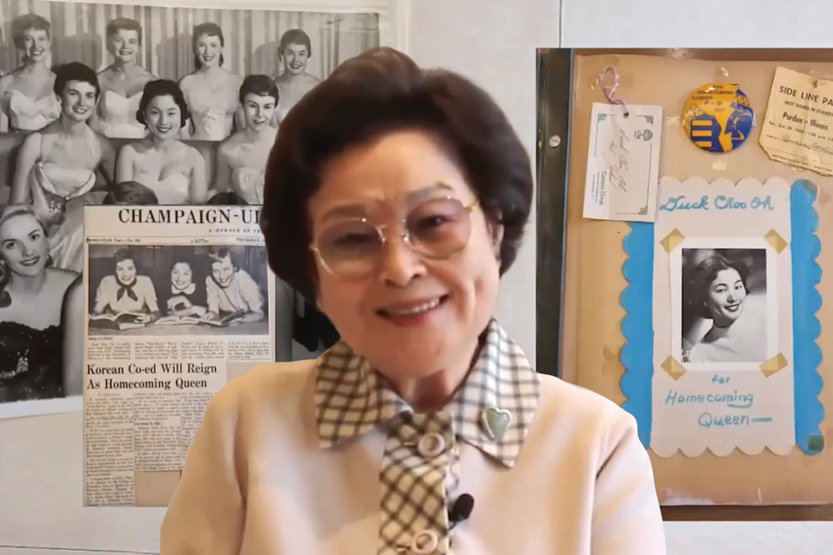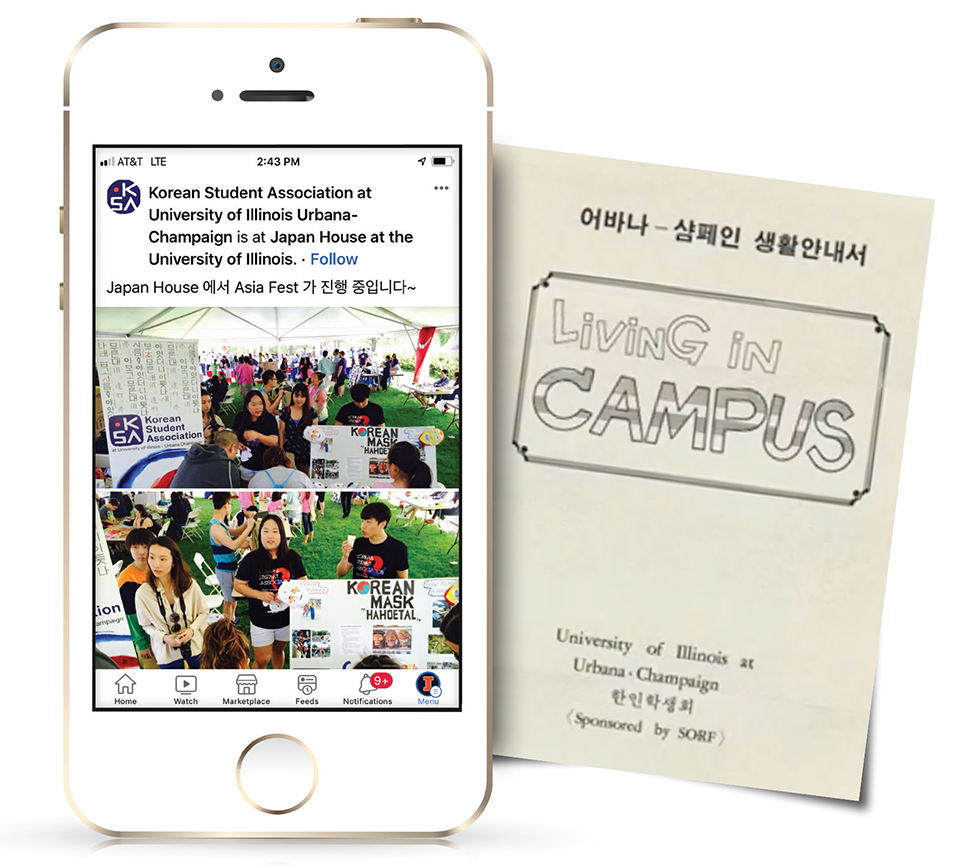Great Friends and Beautiful Memories
 Duck Choo Oh shared her memories of being the first Korean-born Homecoming Queen at the University of Illinois—and perhaps the first in the nation—during a virtual centennial celebration hosted by the UI Alumni Association, Korea Chapter. (Images courtesy of UI Archives)
Duck Choo Oh shared her memories of being the first Korean-born Homecoming Queen at the University of Illinois—and perhaps the first in the nation—during a virtual centennial celebration hosted by the UI Alumni Association, Korea Chapter. (Images courtesy of UI Archives) In 1955, some 60,000 spectators in Memorial Stadium witnessed history in the making as Duck Choo Oh, ’56 LAS, accepted her tiara and title as Illinois’ Homecoming Queen. Oh was the first Korean student at the U of I—and likely the nation—to attain such an “all-American” honor.
Coming just two years after the end of the Korean War, this was a big story. The Associated Press ran with it, and news of Illinois’ Homecoming Queen quickly spread beyond the confines of Urbana-Champaign. Oh says she received well wishes from across the nation, as well as her home country and points around the globe.
Oh’s Homecoming coronation symbolized the blossoming of an international era for the University of Illinois. The seeds of that growth started nearly five decades earlier when University President Edmund Janes James (1904–20) formed a close relationship with Wu Ting-fang, the Chinese minister to the U.S. For James, that relationship was mission critical. In 1906, he wrote, “The nation which succeeds in educating the young Chinese of the present generation will be the nation which, for a given expenditure of effort, will reap the largest possible returns in moral, intellectual and commercial influence.” James even persuaded Wu to deliver the University’s 1908 Commencement address.
By the 1950s, the University had enlisted its top academic officials to recruit foreign students. Responding to the ravages of the recent war, the U of I Korean Student Aid Committee—organized by professor Thomas Benner, former College of Education dean—raised scholarship funds to support Korean attendees. It was Benner, in fact, who persuaded Oh to relocate from Seoul to Urbana-Champaign with that support.
“I came to consider Champaign-Urbana my second home”—Duck Choo Oh
Today, the U of I enrolls more students from Korea than any other U.S. public university. “We’ve had a great reputation in Asia for a long time,” says Mike Nelson, ’12 LAS, MA ’14 LAS, Illinois’ associate director of advancement. “A number of students come because of the reputation of business and engineering. The others study pretty much everything else.”
Multiple Korean student organizations have been vital to welcoming those new scholars, most notably the Korean American Student Organization. Formed in 1955, the group currently boasts more than 1,000 members and has sponsored tournaments, talent shows, career fairs and even a monthly magazine.
The number of Korean students at Illinois has sparked other cohesive networks, including a Facebook group with approximately 2,000 members. “The students can ask questions in their own language such as ‘How does laundry work in the dorms?’ ” Nelson says. “It’s an informal means of support.”

The U of I enrolls more students from Korea than any other U.S. public university, giving rise to a 1,000-plus-member Korean American Student Organization and a support network that includes a Facebook group with approximately 2,000 members. (Images courtesy of Korean Student Organization and UI Archives)
That kind of hospitality also is instrumental in helping Korean students—or new arrivals from any of the 113 nations that comprise the University’s international student body—adjust to U.S. culture. Hoyeon Lee, ’22 BUS, a graduate student studying accounting, credits the “strong Korean network and sense of community” for helping her to quickly adapt to American life. In fact, she is now so acclimated that she can joke about her volunteer stint as a tax adviser for other international students. “I feel the same anxiety facing the 1040 [tax form] that they do,” she says with a smile.
For Duck Choo Oh, an American education was the greatest hope for her future. The daughter of the president of the Korea Trust Bank, Oh and her family had to flee Seoul when the Communists invaded South Korea. After completing her bachelor’s degree, she stayed on to pursue graduate studies, met her future husband on campus and later gave birth to their first child at Carle Memorial Hospital. “I came to consider Champaign-Urbana my second home,” she says.
Oh told her story as a moving high point in an April 2022 virtual event celebrating 100 years of a Korean student presence at Illinois, held by the UI Alumni Association, Korea Chapter. Its 1,500 members are very active, hosting picnics, hikes and the chapter’s signature event, an annual concert performed by music alumni that raises money to buy musical instruments for children. Headed by Sanghoon Lee, ’01 BUS, an IT firm CEO, the alumni chapter is honoring its centennial by raising funds for the University’s Korean Language Program.
Hyungseok Hahm, MS ’04 ENG, PHD ’08 ENG, the chapter’s secretary general, summed up the warmth and gratitude that so many Korean alumni feel for their Alma Mater. A senior portfolio manager for the Korea National Pension Service, Hahm said that despite being accepted at two other top U.S. universities, his college choice was a no-brainer. “For its great education, I chose the U of I. I made great friends and beautiful memories there.”

